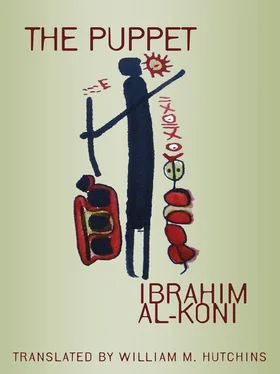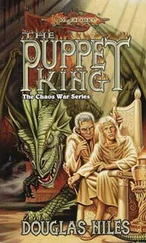Ibrahim al-Koni - The Puppet
Здесь есть возможность читать онлайн «Ibrahim al-Koni - The Puppet» весь текст электронной книги совершенно бесплатно (целиком полную версию без сокращений). В некоторых случаях можно слушать аудио, скачать через торрент в формате fb2 и присутствует краткое содержание. Год выпуска: 2015, Издательство: Center for Middle Eastern Studies, University of Texas, Жанр: Современная проза, на английском языке. Описание произведения, (предисловие) а так же отзывы посетителей доступны на портале библиотеки ЛибКат.
- Название:The Puppet
- Автор:
- Издательство:Center for Middle Eastern Studies, University of Texas
- Жанр:
- Год:2015
- ISBN:нет данных
- Рейтинг книги:3 / 5. Голосов: 1
-
Избранное:Добавить в избранное
- Отзывы:
-
Ваша оценка:
- 60
- 1
- 2
- 3
- 4
- 5
The Puppet: краткое содержание, описание и аннотация
Предлагаем к чтению аннотацию, описание, краткое содержание или предисловие (зависит от того, что написал сам автор книги «The Puppet»). Если вы не нашли необходимую информацию о книге — напишите в комментариях, мы постараемся отыскать её.
The Puppet — читать онлайн бесплатно полную книгу (весь текст) целиком
Ниже представлен текст книги, разбитый по страницам. Система сохранения места последней прочитанной страницы, позволяет с удобством читать онлайн бесплатно книгу «The Puppet», без необходимости каждый раз заново искать на чём Вы остановились. Поставьте закладку, и сможете в любой момент перейти на страницу, на которой закончили чтение.
Интервал:
Закладка:
Ibrahim al-Koni
The Puppet
CHARACTERS
Abanaban, chief vassal
Aghulli, sage and leader
Ahallum, warrior hero
Amasis the Younger, a noble
Asen’fru, tax administrator
Chief Merchant, the man with two veils
Emmamma, venerable elder
Imaswan Wandarran, spokesman for the council of nobles
She-Jinni, the Mute Soprano
Tayetti, commander of anti-gold campaign
Wretch, a young lover
INTRODUCTION
My starting point is the desert. As is inevitable with one’s birthplace, the desert buries enigmatic signs in the souls of its natives that slumber deep within and one day must awake. The signs that my Great Desert planted within me have made a poet of me, and a seeker after the truth of this world. 1
Ibrahim al-Koni, who was born in 1948, is an international author with many authentic, salient identities. He is an award-winning Arabic-language novelist who has already published more than seventy volumes, a Moscow-educated visionary who sees an inevitable interface between myth and contemporary life, an environmentalist, a writer who depicts desert life with great accuracy and emotional depth while adding layers of mythical and literary references the way a painter might apply luminous washes to a canvas, a Tuareg, whose mother tongue is Tamasheq, and a resident of Switzerland since 1993. Ibrahim al-Koni, winner of the 2005 Mohamed Zafzaf Award for the Arabic Novel and the 2008 Sheikh Zayed Award for Literature, has also received a Libyan state prize for literature and art, prizes in Switzerland, including the literary prize of the canton of Bern, and a prize from the Franco-Arab Friendship Committee in 2002 for L’Oasis cachée .
After spending his childhood in the desert, al-Koni began his career writing for the Libyan newspapers Fazzan and al-Thawra . He then studied comparative literature at the Maxim Gorky Literature Institute in Moscow, where he also worked as a journalist. He later lived in Warsaw for nine years and edited the Polish-language periodical as-Sadaqa , which published translations of short stories from Arabic, including some of his own. His novels The Bleeding of the Stone, Anubis, Gold Dust , and The Seven Veils of Seth have already been published in English translation, and The Animists is forthcoming. At least seven of his titles have appeared in French, and at least ten exist in German translation. Representative works by al-Koni are available in approximately thirty-five languages, including Japanese.
Ibrahim al-Koni, like Joseph Conrad, has found international acclaim as a novelist while publishing primarily in his second language, in his case Arabic, which he learned to read and write at the age of twelve. Al-Koni grew up speaking Tamasheq, the language of the Tuareg, which has its own alphabet, Tifinagh, that dates back at least to the third century BCE. Arabic-Tamasheq bilingualism among the Tuareg is not uncommon and evidence of this goes back hundreds of years in the form of inscriptions and graffiti in Mali. 2
The Tuareg, or Kel Tamasheq, are traditionally pastoralist, nomadic Berber people who have moved freely across the Sahara from Libya, Tunisia, and Algeria to Mauritania, Mali, Niger, and Burkina Faso. Today national boundaries and policies hinder this migratory pattern, and during the last fifty years there have been armed Tuareg insurrections in Mali and Niger.
Although the Tuareg have been affiliated with Islam for centuries, a tribal code of law still governs traditional Tuareg life, despite the fact that its written version is no longer extant. Al-Koni consistently refers to this Torah-like law with the word naamuus to distinguish the Tuareg law from Islamic Shari‘a law. Although there are some excellent studies of the Tuareg (like The Lesser Gods of the Sahara by Jeremy Keenan), al-Koni’s own publications remain the richest source for information about Tuareg culture. 3
Tuareg culture has attracted considerable attention from outsiders. The blue veils worn by Tuareg men have fascinated intrepid travelers and ethnographers for decades. 4More recently, Tuareg musical groups like Tinariwen and Tartit have achieved international renown, and the Tuareg Festival in the Desert (in Mali) draws visitors from around the world. Tuareg jewelry is sold commercially through the Internet and elsewhere. Furthermore, the Tuareg poet, painter, and calligrapher Hawad, who provided the cover art for this volume, can be seen reciting his Tamasheq poetry on the Internet site YouTube.
Ibn Khaldun (1332–1406), the Arab father of sociology, described the rise and fall of Middle Eastern dynasties, which he said spring from hardy desert nomads (like the Tuareg). When they are united by ‘ asabiya , or group solidarity, they are able to conquer the reigning dynasty in the capital, but after several generations of enervating city life and several stages of governmental consolidation and withering, this now decadent elite falls to the next group of hardy desert nomads united by some new form of group solidarity. 5 The Puppet [ al-Dumya ] (1998) is the central and key panel of a triptych — composed of Waw al-Sughra [New Waw] (1997) and al-Fazza‘a [The Scarecrow] (1998) — that traces the Khaldunian development and eventual decline of an oasis named in honor of the Tuareg’s “lost” oasis, the paradise-like Waw, pronounced like the English word “wow.” Even now this “distant oasis lying beyond every other oasis” occasionally appears, but only to searchers who are not looking for it.
The Puppet focuses on the cusp of the Khaldunian cycle when commerce, marriage, agriculture, and recreation — whether games or cultural activities — are oasis distractions that disrupt the traditional Tuareg nomadic way of life. Consequently The Puppet ’s hero, Aghulli, who still respects Tuareg nomadism, is devastated to learn that his secret supporter is exactly the wrong sort of (mercantile) person.
The Puppet is a completely realized tragedy at both personal and communal levels. If the flawed hero Aghulli experiences the reversal, recognition, and suffering of an Aristotelian tragic hero, 6the oasis community’s flowering inevitably leads to its withering and eventual destruction. Plato in The Republic discussed the different types of states, which correspond to types of people, and their degeneration. Al-Koni in The Puppet captures the moments in this arc when the withering sets in as an aristocracy (rule by the best: the venerable elder Emmamma) degenerates first into a timocracy (rule by the ambitious: Aghulli, the sage, who succumbs to ambition) and then into an oligarchy (rule by the rich: the chief merchant). Plato’s character Socrates remarked: “The downfall of timocracy is due to the flow of gold into those private stores we spoke of.” 7Aghulli’s campaign against gold makes perfect sense in this framework.
Although the novel’s title brings to mind contemporary allegations of political manipulation, the author has stressed repeatedly that he is not a political writer. According to him, The Puppet portrays a good man who has been asked to lead a corrupt society. Al-Koni’s political fiction is philosophical, and some readers have complained that these novels are intellectually demanding. His elegant, formal Arabic can also be challenging and suggests a clear and simple but formal English rendition, with an occasional modern word added to rouse the reader from any mythical slumber. Regardless of its philosophical potential and language, The Puppet is most of all a gripping, expertly crafted story of bloody betrayal inspired by both gold lust and an ancient love affair.
Читать дальшеИнтервал:
Закладка:
Похожие книги на «The Puppet»
Представляем Вашему вниманию похожие книги на «The Puppet» списком для выбора. Мы отобрали схожую по названию и смыслу литературу в надежде предоставить читателям больше вариантов отыскать новые, интересные, ещё непрочитанные произведения.
Обсуждение, отзывы о книге «The Puppet» и просто собственные мнения читателей. Оставьте ваши комментарии, напишите, что Вы думаете о произведении, его смысле или главных героях. Укажите что конкретно понравилось, а что нет, и почему Вы так считаете.












